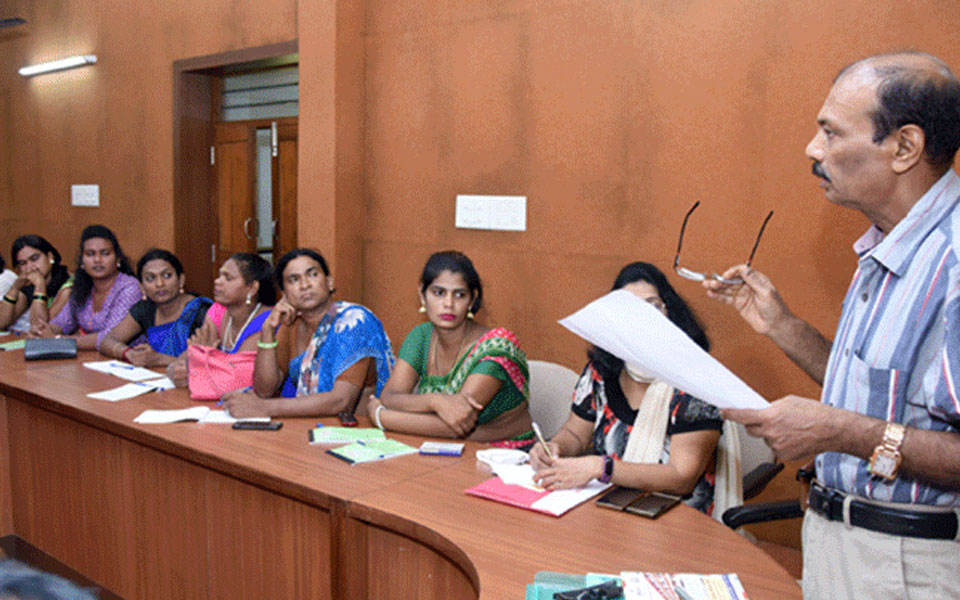Mangaluru, June 6: Krishi Vignana Kendra (KVK) head Dr Shivakumar Magada said that steps would be taken to set up manufacturing unit on the premises of KVK to help the sexual minorities build a respectful life by taking up agriculture related self employment opportunities.
Speaking at a workshop on conducting skills development training programme under the Parivarthana Trust for the sexual minorities, at the zilla panchayat hall here on Wednesday, he said that people could take up dairy farming, mushroom farming, manufacturing of agriculture related products, bakery products, fishiculture and other self employments without any investment and education qualification.
At this moment, sexual minority community member Sanjana said that they were finding it difficult to given even the rent for the houses. Moreover, they were not getting the rented houses in the city because of some social stigma. Then how can they start self employment, the member asked.
Responding to it, Shivakumar said that if the sexual minorities came forward, he would make arrangement for manufacturing unit on the premises of the KVK. They could also stay there during their training. The KVK would make arrangement for capital investment required for some raw materials. They could make their products in their own ‘Parivarthan’ brand and sell them, he said.
He said that the state government has introduced Saviruchi Kaituttu Canteen exclusively for women and it has good demand. Sexual minorities who are interested in cooking could involve themselves in it, he said.
But another sexual minority member said that “We can prepare good and tasty food. But who will take our food. When the society is still keeping us away from the mainstream, what is the use of preparing tasty food”, the member said.
Saviruchi canteen
Shivakumar said that the state government had introduced Saviruchi canteen which has good demand. Sexual minorities could involve and take up the responsibility of the canteens, he said.
But a member from the sexual minority community said that “we can prepare good and tasty food with cleanliness. Who will take our food? When the society is not in a position to accept us, who will take our food and what is the use of preparing food”, the member asked.
But Zilla Panchayat project officer Lokesh said that the food prepared by the sexual minorities could be taken for government sponsored programmes. Let the change begin from the government side, he advised.
Rudseti director James D’Souza, Lead Bank manager Francis, woman and child welfare department deputy director Sundara Poojary, KGTTI staff Megha and Priya explained about the various employment schemes.
‘Treat us like others’
“Everybody talks that the society has changed, perception of the people is changed towards us and we should come to the mainstream of the society. I have learnt beautician course and working as a beautician. But a few days ago, when I was with my friends in one night, police have come and forced me to become nude and assaulted me”, another member said.
“We like to live with you people. Even then, we are being separated as sexual minorities. Are we not looking like women? If the same assault was happened on a woman, what would be the response of the society? Why do you separate us? Treat us like you people and allow us to live like others in the society”, she said.
Parivarthana Trust head Violet Pereira, and more than 20 sexual minorities participated in the workshop.

Let the Truth be known. If you read VB and like VB, please be a VB Supporter and Help us deliver the Truth to one and all.
Dubai: Smoke was seen rising from an area near the United States Consulate in Dubai, according to witness accounts cited by Reuters.
There was no immediate official confirmation on the extent of damage or whether there were any casualties in the incident.
Earlier, the US embassy in Riyadh, Saudi Arabia’s capital, was also attacked. Authorities reported damage to the premises, but no casualties were recorded.
The developments come amid heightened tensions in the region, with Iran continuing to target US interests in the Middle East following deadly attacks launched on Saturday by Israel and the United States.
Near US embassy in Dubai pic.twitter.com/z5VTZNVxNO
— Sahil Shah (@thesahilsshah) March 3, 2026





